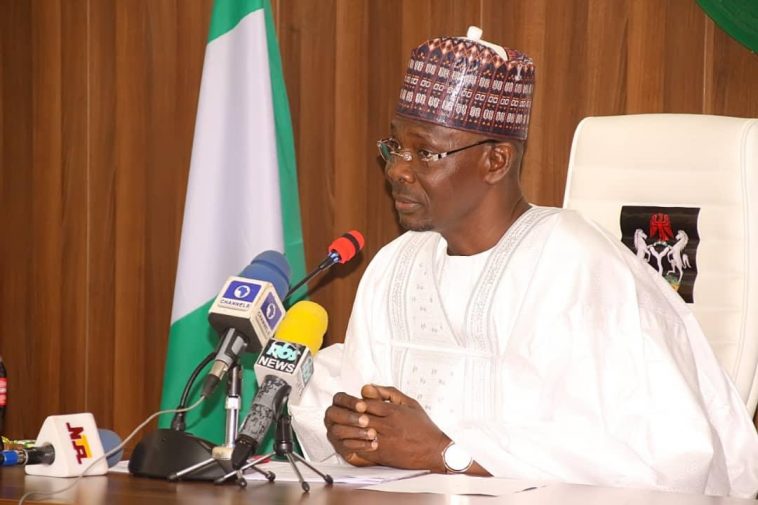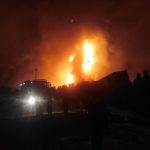By David Odama
Tiv Communities and farmers in Obi Local Government Area of Nasarawa State yesterday embarked on a protest to register their displeasure against allege forceful seizure of their ancestral lands by governor Abdullahi Sule government.
This is even as the farmers have rejected a plead dialogue being initiated to convince the farmers, who said they were not consulted prior to government’s activities on the land.
According to the aggrieved Tiv Communities cutting across several local governments in t Nasarawa south, “demanded for justice is our prayers and we called on Governor Abdullahi Sule to immediately halt all processes aimed at acquiring their farmlands”.
The protesters, drawn from Ayakeke, Osula, China, Shankodi, Udugh, Ikychiha, Utsuwa, and Daura communities, expressed their frustration during the governor’s visit to inspect farmlands intended for the 2025 farming season.
Speaking on behalf of the protesting group, Benjamin Tyoga said the lands in question have been in the possession of their forefathers for hundreds of years and any attempt to take them without proper dialogue amounts to oppression.
“We don’t believe the governor’s words because the land belongs to our fathers, hundreds of years ago. If it is to be taken, we should have been consulted—not just for him to come and inspect and talk to us because we are protesting,” Tyoga said.
“He said we should send leaders, but we are the people—all of us here. Why can’t he talk to us directly? It is not fair. This is purely seizure of our lands by force,” he added.
Tyoga further argued that infrastructure developments such as roads mean nothing if they are deprived of their main source of livelihood—farming.
“If you create roads and we don’t have what to eat to survive, what have you done? We are predominantly farmers, and we want the governor to consider the fact that we are citizens of Nasarawa State. We have the right to protest and demand for things that belong to us,” he said.
He lamented the difficulty in accessing the governor, stating that the protest provided a rare opportunity for direct engagement, which the governor did not fully utilize.
“He is the governor. Meeting him is difficult. This is an opportunity to talk to us in a language we understand. Rather, he said we should send leaders. How do we get to him? We are calling on the governor to leave our land. If he wanted to speak to us, he would not have come first to see the lands before calling to see us. If not for our protest, he wouldn’t have even talked to us. We will not rest until justice is served,” Tyoga stated.
Another protester, Mrs. Terhemba Iveren, echoed the same concerns. “This is not just land, this is our identity, our history, our home. You cannot just come and take it without talking to us directly. We are not saying we don’t want development, but let it not come at the cost of our survival,” she said.
Responding to the protesters Earlier, Governor Abdullahi Sule cautioned the farmers against inciting unrest and urged them to channel their grievances through recognized leadership.
“Send your leaders to represent you to speak to me. Don’t send troublemakers because if you send troublemakers, you all will be in trouble,” Governor Sule warned.
He assured the people that the initiative is in their best interest and not a personal venture.
“I am the first governor to visit your community and even Jangwa. There are other things we intend to do for you—good roads and other infrastructure that will better your community. The farm is not my personal property but for the people of Nasarawa State, including you. That is why I came here myself to see things,” he said.
The governor maintained that the farmland project is already attracting investment and emphasized that, legally, all land belongs to the state government.
“All lands belong to the state government. We can only allow and give time for those that have economic trees, and if need be, we will compensate,” he explained.
Despite the assurances, local elders and community members expressed dissatisfaction with the handling of the matter. Elder Iorliam Aondofa called on the governor to organize a town hall meeting for more inclusive dialogue.
“The governor must return with his team to genuinely meet with us—not just visit our land and leave. Let there be a town hall meeting where everyone can air their views. That is how democracy works,” Aondofa said.
Several other farmers confirmed they were never officially informed about the project and were shocked when government officials began visiting their land.
“They just came one day and said the land is for a government farm project. That is not how things should be done,” said Terver Gbakough, a young farmer. “We deserve respect and fairness. If there is any plan to take land, it must be with our full knowledge and agreement.”
Human rights advocates in the state have begun raising concerns. Comrade Isaac Gbande, a land rights activist, warned that the government’s approach could lead to long-term conflict.
“This is not just a policy issue, it’s a human rights matter,” Gbande said. “The government must follow the principles of free, prior, and informed consent before displacing any community, even for development purposes. Anything short of that will create long-term resentment and resistance.”
Security operatives present at the scene were able to keep the situation under control as tensions ran high. Observers have since called for a more transparent and community-inclusive approach moving forward.
For now, the protesting Tiv farmers have vowed to continue demanding justice and recognition of their ancestral rights.
“We are not against development,” Benjamin Tyoga concluded. “We are against the injustice of being ignored, displaced, and spoken to like we don’t matter. All we ask is to be treated with respect and fairness in our own state.” the protesters declared






